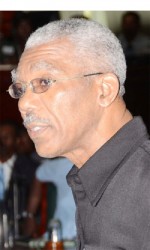APNU will not alter its stand on the anti-money laundering bill, which it maintains needs more work before passage, according to leader David Granger, who says the main opposition also sees the need for the establishment of a Public Procurement Commission (PPC) but believes the two issues are not tied to each other.
“What I was trying to say was the [anti-money laundering legislation] needs to be considered and the Procurement Commission will need to be also studied. We want them both to pass and let me say this, we are committed to both there should be no doubt that we are supportive of both,” Granger told Stabroek News yesterday.
Granger noted that APNU has long taken a position on the anti-money laundering legislation and this has not changed.

“We are going to maintain that position, what we need is to have the Select Committee do the work they were assigned to do,” he said, referring to the work of the parliamentary committee, which was wrapped last week by government. “There is no virtue in passing amendments that are incomplete and still need to be organised and studied,” he added.
Granger was responding to assertions contained in a letter written by analysts Ramon Gaskin and Christopher Ram and published in Stabroek News yesterday, in which they suggest that APNU join the AFC in making the establishment of the PPC and other outstanding constitutional bodies a precondition to discussing the anti-money laundering bill.
“We share Mr. Granger’s interest in having a proper anti-money laundering Bill that will work to stamp out money laundering. Where we disagree strongly with him is that there is no nexus in the elements of a meaningful national legislative programme,” they wrote. “In taking such an approach, Mr. Granger is acting as the PPP/C wants him to,” they added.
The duo said that they feared the consequences of not having the requisite democratic and governance structures much more than the consequences of a delay in the passing of the bill.
“We believe that the consideration of the Anti-Money Laundering Amendment Bill which the Government and the PPP/C are now rushing to pass presents the ideal opportunity to deal with this unacceptable state of affairs. It is for these reasons that we propose that the Opposition Parties demand action on these critical issues as a necessary precondition for even agreeing to discuss the Bill and the Principal Act,” they said.
Granger stated that he read the letter in yesterday’s edition of Stabroek News and that he had sufficiently clarified APNU’s position on the importance of both the anti-money laundering legislation and the PPC, since one is currently being presented in the National Assembly and it had to be dealt with first.
Last Friday, during APNU’s weekly press briefing, Granger stated that the coalition’s duty was to ensure that a good anti-money laundering bill was passed and that it was a different matter entirely if the PPC comes along, while adding that if and when that should be the case the party will deal with it.
When contacted yesterday, Granger stated that it was not one over the other. “The focus is we have lost precious time dealing with the [anti-money laundering legislation], when we could have been continuing work with the select committee and compiling information. We want a good [bill] and that is a different matter over the Commission… we know that the PPC has to be discussed and that it has been mandated by the constitution years ago, but to tie the two as one discussion doesn’t give each priority,” he said.
The AFC has publicly stated that its support for the anti-money laundering amendments is dependent on the establishment of the PPC. The AFC’s reasoning for this has been that the legislation and the establishment of the PPC would work in correlation to each other.
While the bill will most likely go through its third reading today when the National Assembly reconvenes, the set up of the PPC remains stalled although the government has made numerous verbal commitments.





